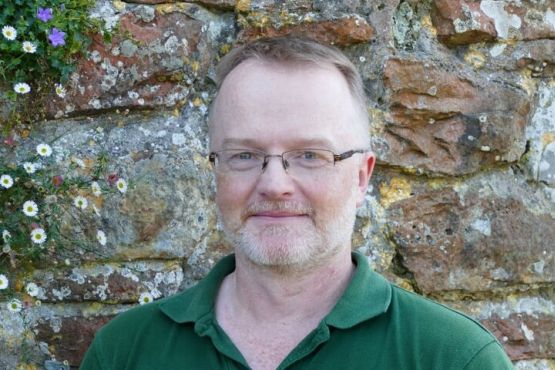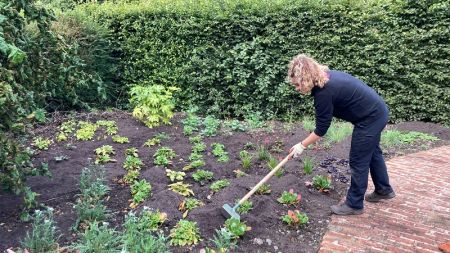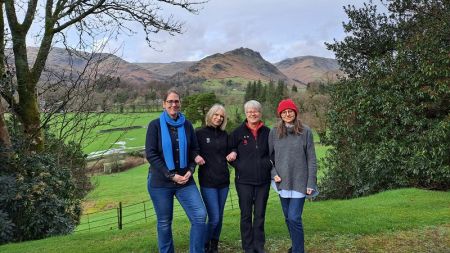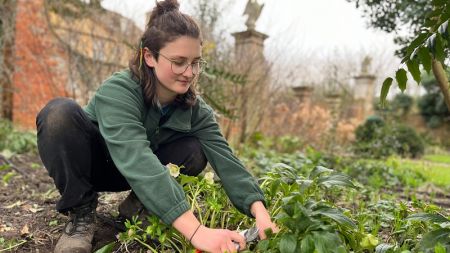From challenges to opportunities – why I love working for the National Trust

Ranger Michael has worked for the National Trust in Winchelsea, East Sussex for the past six years. His job speaks to his passions, and he enjoys the many aspects of the role. Here, Michael tells us why autism helps him in his day-to-day role and how he’s been supported by the National Trust.
I’m extremely fortunate that one of my major passions in life, nature, is also part of my job. As part of a very small team – there’s only two of us – we look after 1,100 acres of habitats, including coppiced woodland, reedbeds, coastal paths, wildflower meadows, grazing marsh and a community orchard. As well as hard, physical work such as coppicing, reedbed maintenance and fencing, we also get involved in wildlife monitoring and photography.
In the spring and summer, we do regular bird, butterfly, moth, dragonfly, bumblebee and water vole surveys, which is the highlight of my job, and the reason I wanted to become a ranger. To help us, we use trail cameras and passive sound recorders to record our nocturnal and more timid creatures, which opens up a whole new world of interest.
With our small team of volunteers, we also make and put up many bird boxes in different habitats, whether that’s replacing potential nest sites in a newly coppiced area or putting up a couple of barn owl boxes in our farmland. We’ve recently been involved in putting up 15 boxes throughout the nearby community to help the local swift population.
A wide-ranging impact
As a National Trust ranger, my work takes me beyond looking after the land the Trust owns. I run a weekly community moth trap, which I take to different gardens each week, and show residents the delights of the nocturnal ‘butterflies’ they had no idea were in their gardens. This has led to the formation of a wildlife group in the town that aims to educate residents about nature, and I take members on regular nature walks as part of that.
Having all the videos and images of the wildlife around the town has also led me to giving talks to local societies, some natural history societies and National Trust Associations. This all makes being a National Trust ranger a very varied and interesting job. After all, how many people can say that they’re able to mould their specialist interest to their job?
Adjustments to suit me and my needs
What makes this a perfect job for me is that I can deeply research the subjects that interest me and learn and discover a lot of information that I find interesting. This appeals to my autistic brain. So many aspects of modern life I find perplexing and overwhelming, especially people not following rules and being loud, but being out in nature is very relaxing and restorative for me.
I’m so lucky to have a very supportive and understanding line manager and general manager who, while not necessarily fully understanding autism, fully support me and my needs. There’s no problem with me wearing noise-cancelling headphones in the office when needed or using a fidget toy in a meeting. Even the location for the pre-season meeting has been moved, partly because I can’t cope with the room it was previously held in being very echoey and claustrophobic. I genuinely feel as though I could ask for any adjustments, and it wouldn’t be a problem.
I also feel my autism brings many benefits to the role – the retention of knowledge of my interests, honesty (although that can work both ways), reliability, focus and creative, logical thinking to name a few. I also realise that it brings some challenges too, including limited amounts of energy, particularly when dealing with people, and my somewhat black and white thinking. But, on balance, I feel both the National Trust and I get an equally good deal!
The Workability Network
Joining the Workability group at the Trust has given me access to a group of people who genuinely understand and support my challenges as an autistic person in the workplace. In every other job I’ve had, I’ve always felt tolerated, but not necessarily supported or included. It was rather overwhelming at first, knowing I could have a job where there’s a support network that understands me, is tolerant and genuinely supportive, and aims to make the Trust a better place to work, for everybody.
Categories
- Apprenticeships (47)
- Building Surveying (3)
- Business Services (2)
- Catering (1)
- Communications and Marketing (2)
- Conservation (10)
- Countryside (8)
- Curatorship (3)
- Diversity (1)
- Estate Management (4)
- Finance (2)
- Food and Beverage (7)
- Fundraising (8)
- Gardening (11)
- General Management (2)
- Governance (2)
- Heritage Building Crafts (3)
- Holidays (3)
- House and Collections (4)
- IT (6)
- Membership (1)
- People and Legal (3)
- Projects and Programmes (5)
- Retail (2)
- This is us (6)
- Visitor Experience (3)
- Volunteer and Community (3)
- Volunteering (1)
- Work Experience (1)
- Young People (6)


